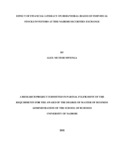| dc.contributor.author | Mwenga, Alex M | |
| dc.date.accessioned | 2019-01-15T06:34:41Z | |
| dc.date.available | 2019-01-15T06:34:41Z | |
| dc.date.issued | 2018 | |
| dc.identifier.uri | http://hdl.handle.net/11295/104671 | |
| dc.description.abstract | The objective of this research was to establish the effect of financial literacy on behavioral biases of individual investors at the Nairobi Securities Exchange. Research targeted population was all the individual investors at NSE whose number stood at 1,200,175 as at 31st July 2018.The study sample size was 100 individual investors who were picked randomly from individuals who visited the offices of the 24 registered stocks brokerage firms in Kenya from 3rd to 20th September,2018 . The research used first-hand information. This was gathered using questionnaires administered to the individual investors who visited the offices of the firms between 3rd and 20th September 2018. Descriptive and inferential statistics methods were used to analyze the study data. The researcher used simple regression analysis technique in establishing the type of the relationship that exist between the independent and dependent variables in the study it also considered the effect of control variables. The study found out that individual investors at the NSE lacked adequate levels of financial literacy and as a results suffered from behavioral biases. Further the study established the existence of a strong positive relationship between financial literacy and behavioral biases .The researcher determined the coefficient of variation (R) which indicates the magnitude of the relationship between the study main variables. The resultant coefficient value was 0.760 which approached +1 implying the two variables had a strong relationship. In testing how the dependent variable varied as results of changes in independent variables, the study results yielded R Square coefficient value of 0.578 meaning according to the study 57.8% variation on behavioral biases was explained by financial literacy. The findings also revealed that financial literacy is a significant factor for explaining behavioral biases with P-value<0.05. The study recommends that various institutions should organize financial literacy education programs aimed at equipping the existing and potential investors with necessary financial knowledge. The study also recommend incorporation of financial literacy in Kenyan education curriculum starting from lower levels of education to ensure all individuals in Kenya who goes through the entire education systems are equipped with financial literacy skills | en_US |
| dc.language.iso | en | en_US |
| dc.publisher | University of Nairobi | en_US |
| dc.rights | Attribution-NonCommercial-NoDerivs 3.0 United States | * |
| dc.rights.uri | http://creativecommons.org/licenses/by-nc-nd/3.0/us/ | * |
| dc.title | Effect of Financial Literacy on Behavioral Biases of Individual Stocks Investors at the Nairobi Securities Exchange | en_US |
| dc.type | Thesis | en_US |



